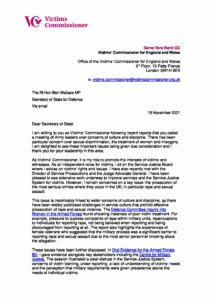Letter to Secretary of State for Defence on prosecution of rape within the Service Justice System
Read the accompanying blog: Without basic access to justice, the integrity of the military is at risk
Sent via email
19 November 2021
Dear Secretary of State
I am writing to you as Victims’ Commissioner following recent reports that you called a meeting of Army leaders over concerns of culture and discipline. There has been particular concern over sexual discrimination, the treatment of women and misogyny. I am delighted to see these important issues being given due consideration and I thank you for your leadership in this area.
As Victims’ Commissioner, it is my role to promote the interests of victims and witnesses. As an independent voice for victims, I sit on the Service Justice Board where I advise on victims’ rights and issues. I have also recently met with the Director of Service Prosecutions and the Judge Advocate General. I have been pleased to see extensive work underway to improve services and the Service Justice System for victims. However, I remain concerned on a key issue: the prosecution of the most serious crimes where they occur in the UK, in particular rape and sexual assault.
This issue is inextricably linked to wider concerns of culture and discipline, as there have been widely publicised challenges in service culture that prohibit effective prosecution of rape and sexual violence. The Defence Committee Inquiry into Women in the Armed Forces found shocking instances of poor victim treatment. For example, pressure to supress complaints of rape within military units, repercussions to individuals for reporting rape, not being believed when reporting and being discouraged from reporting at all. The report also highlights the experiences of female veterans who suggested that the military process was a significant barrier to reporting rape and sexual assault due to the most senior personnel knowing about the allegation.
These issues have been further discussed. In Oral Evidence for the Armed Forces Bill, I gave evidence alongside key stakeholders including the Centre for Military Justice. The session illustrated a clear distrust in the Service Justice System, concerns of victim blaming, under-reporting, a lack of understanding of victims’ needs and the perception that military requirements were given precedence above the needs of individual victims.
The Lyons Review of Service Justice recommended that the most serious crimes, including rape, alleged to have occurred within the UK involving service personnel should be dealt with by the civil justice system. I wholeheartedly agree that rape and sexual assault must be dealt with in this way.
It is crucial that crimes are recognised and victims’ needs are met. Victims cannot be ignored simply because their attacker is “one of our people” in a military environment. They must have access to independent justice. Furthermore, they must have access to independent support to enable them to cope and recover from their experiences.
Without this basic access to justice, the integrity of the military is at risk.
I want to make it clear that the civilian system is not perfect. Prosecution rates are inexcusably low and work must be done to improve the system for victims. As you will be aware, this is a Government priority as the recommendations from the End-to-End Rape Review are carried out. I am pleased to lend my support to this work. However, the civilian system is independent and is able to provide independent support for victims. The work that you have begun will secure the best of the army whilst removing the worst. Giving victims of rape and sexual assault access to independent, civilian support and justice, will be an important step in ensuring this success.
As the Armed Forces Bill has progressed through Parliament, amendments to adopt the Lyons recommendation have failed. Instead, a protocol has been proposed to agree where cases will be heard if there is concurrent jurisdiction. As Secretary of State who is taking this Bill through Parliament, I ask you to reconsider these amendments at the final stages. Should a protocol, instead, come into force, I urge you to ensure that victims’ needs are fully considered, and that victims of rape and sexual assault have access to the civilian justice system.
Our usual practice, in the interests of transparency, is to publish our correspondence on our website shortly after sending unless there is reason not to do so.
Kind regards
Dame Vera Baird QC
Victims’ Commissioner for England and Wales

